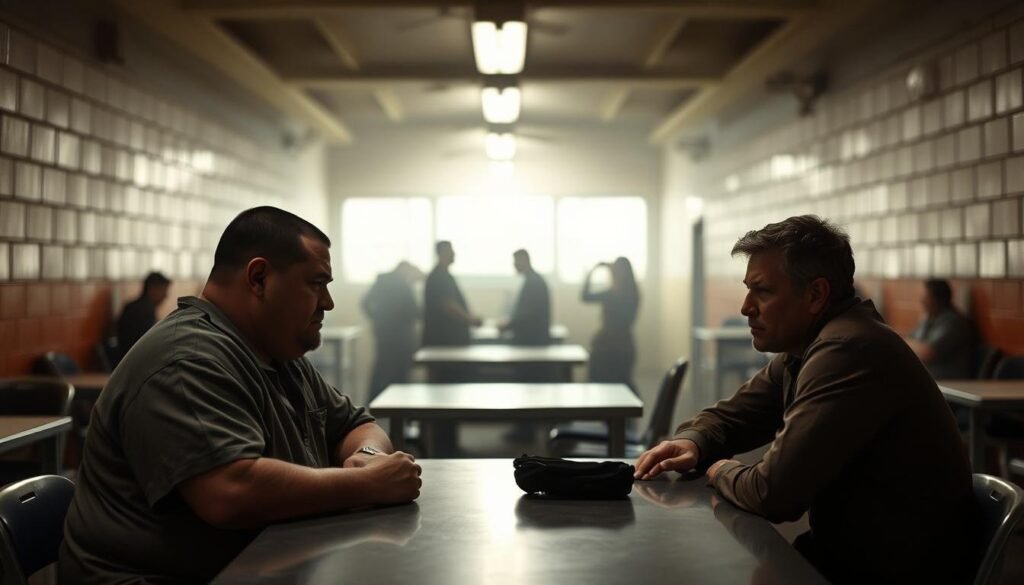Last updated on October 28th, 2025 at 03:16 pm
Can Felons Visit Inmates in California? If you’re a felon in California, you might wonder if you can visit inmates. You’re not alone. Many with a criminal history are unsure about visiting their loved ones in jail.
Knowing about felon visitation rights is key. These rules change by state and even by jail. In California, there are specific rules for who can visit inmates and when.
Understanding correctional visitation policies is important. It’s crucial to know your rights and the steps to follow. This article will give you a detailed look at visitation rules for felons in California. It will help you understand what to expect and how to stay connected with your loved ones in jail.
Contents
- 1 California’s Inmate Visitation Policy Overview
- 2 Can Felons Visit Inmates in California?
- 3 The Visitor Application Process for Felons
- 4 Special Considerations for Felon Visitors
- 5 Conclusion: Can Felons Visit Inmates in California?
- 6 FAQ
- 6.1 Can I visit an inmate in a California correctional facility if I have a felony conviction?
- 6.2 What documentation do I need to provide to visit an inmate in California?
- 6.3 How do I apply to visit an inmate in a California state prison?
- 6.4 Will a background check be conducted as part of the visitor application process?
- 6.5 Can my visitation rights be denied or revoked if I have a felony conviction?
- 6.6 Are there any specific rules or regulations I must follow when visiting an inmate in California?
- 6.7 How can I find more information about visiting an inmate in a specific California correctional facility?
California’s Inmate Visitation Policy Overview
Visiting inmates in California has its own set of rules. The California Department of Corrections and Rehabilitation (CDCR) makes sure visits are safe and secure.
General Rules and Regulations
- Visitors must be on the inmate’s approved visiting list.
- Identification is required; typically, a valid government-issued ID is necessary.
- Visitors are subject to search upon entry.
- Dress code restrictions apply to maintain a respectful environment.
Knowing these rules is key for a good visit. Not following them can mean no visit. Also, some places might have extra rules.
To make your visit go well, do this:
- Learn the specific rules of the facility.
- Plan ahead, thinking about travel and processing time.
- Have all needed documents ready.
By following these tips and knowing California’s visitation rules, you can keep in touch with inmates. This helps them in their rehabilitation. [Can Felons Visit Inmates in California?]
Can Felons Visit Inmates in California?
If you’re a felon wondering if you can visit an inmate in California, the answer depends on several factors. The state’s correctional system has specific rules and regulations. These rules affect who can visit inmates, and having a felony record can make it harder.
How Felony Status Affects Visitation Rights
Your felony status can greatly impact your ability to visit inmates in California. The California Department of Corrections and Rehabilitation (CDCR) checks each visitor’s background. They decide if you can visit based on your felony, how long ago it was, and your behavior since then.
When you apply to visit an inmate, you must give detailed info about your felony. This includes the date and nature of the offense. The CDCR uses this info to see if you’re a risk to the institution’s safety.

The process includes a thorough background check. The CDCR might deny visitation if they think you’re a threat. But, having a felony doesn’t mean you can’t visit. Each case is reviewed individually.
To boost your chances of approval, honesty is key. Provide all needed documents and explain your felony. Show that you’ve changed and are now rehabilitated. [Can Felons Visit Inmates in California?]
In summary, having a felony record can make visiting inmates in California harder. But, it’s not a complete block. Knowing the CDCR’s rules and following the application process can help you succeed.
See Also: Virginia Felon Voting Ban Lawsuit Challenges Restrictions
The Visitor Application Process for Felons
To visit an inmate in California as a felon, you must go through a detailed application process. This is to keep the correctional facilities safe and the community secure.
The first step is to get the needed forms. You can find these on the California Department of Corrections and Rehabilitation (CDCR) website or at the correctional facility where the inmate is.
Required Documentation and Background Checks
You’ll need to provide some documents during the application. This includes:
- Valid government-issued identification
- Proof of residency
- Court documents related to your conviction
You might also have to undergo a background check. This is to make sure you’re not a risk to the facility’s safety.
It’s crucial to be honest and thorough when filling out the application. Any mistakes or missing information could lead to your application being denied.
After you submit your application, it will be reviewed. This can take weeks or even months. So, it’s important to plan ahead.
If your application is approved, you’ll get a notification. You’ll also learn about the visitation schedule and rules. [Can Felons Visit Inmates in California?]
Here are some important things to remember during the application process:
- Make sure to fill out all required fields on the application form.
- Give accurate and truthful information.
- Submit all necessary documents.
- Be ready for a possible background check.
Special Considerations for Felon Visitors
Knowing the rules for felon visitors is key when visiting California’s correctional facilities. If you’re a felon wanting to see an inmate, you need to understand the special rules that apply to you.
What kind of felony you have can change how easy it is to visit. Some felonies might mean you face more checks or rules when you apply to visit. For example, crimes against people or those that threaten the facility’s safety might lead to stricter rules.
Handling Special Cases in the Visitation Process
Who you are to the inmate also matters. Family members, like parents or spouses, often get priority or easier approval for visits. This is different for distant relatives or friends.
- The nature of the felony conviction and its relevance to the inmate or the correctional facility.
- The relationship between the felon visitor and the inmate, including immediate family ties.
- Any previous incidents or violations during visitations, if applicable.
Knowing these details can help you understand your visit rights in California. Having all the right info and documents can make the visit process smoother.
To deal with these challenges, prepare well for your visit application. Learn about the rules for felon visitors, collect needed documents, and know what extra checks you might get.
Being well-informed and ready can help you overcome the hurdles of visiting a felon in California. [Can Felons Visit Inmates in California?]
See Also: Can Felons Live in Government Housing in Texas?
Conclusion: Can Felons Visit Inmates in California?
When you want to visit inmates in California, knowing the state’s rules is key. This is especially true if you’re a felon. You need to understand who can visit and how to get permission.
Final Considerations for Felon Visitors
If you’re a felon in California, your visit rights might be limited. The state checks visitors’ backgrounds. Some crimes could stop you from visiting. [Can Felons Visit Inmates in California?]
To make your visit go smoothly, read the application process carefully. Know what documents you need. Also, be aware of any special rules that might apply to you.
FAQ
Can I visit an inmate in a California correctional facility if I have a felony conviction?
Visiting an inmate in California with a felony conviction depends on several factors. These include the type of felony and the facility’s policies.
What documentation do I need to provide to visit an inmate in California?
You’ll need a valid government ID and proof of your relationship with the inmate. You also must complete a visitor application, which may include a background check.
How do I apply to visit an inmate in a California state prison?
Apply by filling out a visitor application. You can find it on the California Department of Corrections and Rehabilitation (CDCR) website or at the facility. Just follow the instructions.
Will a background check be conducted as part of the visitor application process?
Yes, a background check is often required. It’s part of the application to visit an inmate in a California correctional facility. [Can Felons Visit Inmates in California?]
Can my visitation rights be denied or revoked if I have a felony conviction?
Yes, having a felony can lead to denied or revoked visitation rights. This depends on the situation and the facility’s policies.
Are there any specific rules or regulations I must follow when visiting an inmate in California?
Yes, you must follow the facility’s rules. This includes a dress code, items allowed or not, and behavior during the visit. [Can Felons Visit Inmates in California?]
How can I find more information about visiting an inmate in a specific California correctional facility?
For more details, visit the CDCR website or contact the facility directly. They can provide information on visitation policies and procedures. [Can Felons Visit Inmates in California?]

Van Maldonado, born in California, holds a degree in Criminology and Police Science. Currently serving as an investigative officer at a local police station, he spends his leisure time writing insightful content for FelonScope.com.

